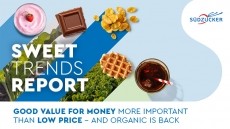Precision fermentation: Is the world ready for animal-free dairy?

Precision fermentation enables the programming of micro-organisms to produce complex organic molecules, such as protein.
The technology is particularly exciting for entrepreneurs looking to develop animal-free dairy alternatives. Start-ups leveraging precision fermentation to imitate cow-derived dairy include Israel’s Remilk and Imagindairy, Estonia’s ProProtein, UK-based Better Dairy, and German operation Formo.
Acknowledging that consumer acceptance is key to market success, this last start-up (formerly known as LegenDairy), has conducted global research to find out more about shoppers’ perceptions.
Together with Mercy For Animals and Fordham University, Formo asked consumers from the UK, Germany, Singapore, and the US how they react to the general concept of precision fermentation.
Other questions included: In what ways do different positive/negative frames about precision fermentation resonate with potential consumers? And what names do consumers prefer for the products/process associated with precision fermentation?
Consumer reactions to the concept
As part of the study, participants read an introduction to precision fermentation-made dairy. Initial responses largely fit into three main areas: the practicalities of consuming the products, support for the sentiments behind the technology, and inquisitiveness/unnerve around the production process and its implications.
“Consumers expressed intrigue and disbelief that such products were possible, with many indicating that they would want to try the product themselves to compare it to conventional dairy,” noted the study authors.
In order to buy precision fermentation made dairy products, however, consumers said they would demand high-quality taste and performance.
Concerning the production method, a majority of respondents expressed either a desire for deeper understanding of the process or unease. “Many wanted to know whether the product was natural or artificial, leading from here into questions of how safe the products would be and what bodily effects it might have, with some looking for data that could answer these questions for them,” wrote the authors.
A particular ‘red flag’ for several participants in this group was the word DNA, which they deemed too ‘techy’ and ‘creepy’. A small number of participants expressed ‘impressed wonder’.
Positive and negative frames about precision fermentation
Animal welfare and the environment were two positive frames discussed by participants.
There was ‘near unanimous’ agreement that society should work harder to treat animals with dignity. Some participants pushed back against the idea that most animals lived in such conditions, expressing discontent for what they considered a ‘manipulative’ depiction of dairy production. The majority agreed that new methods of producing dairy would reduce the need to subject cows to the poorer welfare conditions of industrial animal agriculture.
The ‘vast majority’ of participants responded positively to the frame concerning the environment. “We need to do whatever we can to reduce the effect on the environment,” noted one participant (aged 42) from the UK. Reasons for supporting this argument included a need to reduce emissions, food miles, and the land and natural resources required for dairy production.

In the negative frames camp, the two most pertinent amongst consumers were precision fermentation’s subversion of nature and concern around ‘eating the unknown’.
According to the findings, a ‘near-universal’ agreement was established that ‘unbridled meddling with nature’ was undesirable. A 25-year-old participant from Singapore noted: “As much as I like innovation, as much as possible natural is best, you know?” At the same time, a majority outlined a more nuanced and necessary relationship between technology and nature, referencing ‘widely embraced’ technologies such as plant breeding, hydroponics, and vaccines.
‘Eating the unknown’ was largely associated with personal health effects of our diets. While it was suggested many participants frequently ate things they did not understand already – a 32-year-old participant from Germany said: “I never know what I’ve eating anyway – there are lots of E-numbers in everything I buy” – most appreciated we should be more aware of what we put in our bodies. ‘Real’ food was deemed preferable to our ‘status-quo overreliance’ on processed foods.
What’s in a name?
Participants were asked to consider potential names to describe the product. The clear favourite amongst respondents was ‘animal-free dairy’, who, for the most part, deemed it ‘appealing’ and ‘straightforward’.
The next-most favoured term was ‘next-gen dairy’. Some found it ‘catchy’ and positively associated it with progress and the future. “It makes us think, like, really long-term and what’s to come in the future,” noted a 25-year-old respondent from Singapore. At the same time, there were ‘few’ strongly negative reactions to this term from people who did not judge it to be a good fit for a food product.
‘Cultivated dairy’ was also well-received. For some, the term ‘cultivated’ reminded them of scientific, cellular producers, while for others, it suggested an association with ‘caringly performed agricultural processes’. “You can cultivate a culture in a Petri dish. Right. But you know, you can cultivate a garden. It seems to be a good balance between organic and scientific,” noted a 28-year-old respondent from the US.
Amongst the least favoured choices were ‘bio-identical dairy’ and ‘parallel dairy’. The former, because most found it ill-suited as a name for a food product, and the latter, because it ‘lacked clarity’ or wasn’t descriptive enough. “It’s not scientific. It’s more science fiction,” noted a 50-year-old from the UK. Over in the US, a participant said it “sounds like the Twilight zone, a parallel universe.”
Top-line points for start-ups and policymakers
Amongst the key takeaways for start-ups was that innovators should use the term ‘animal-free dairy’ to describe dairy products produced through precision fermentation and explain how the technology works as simply and clearly as possible.
Start-ups should approach concerns over the ‘naturalness’ of the products with transparency and responsibility, noted the report authors, who stressed entrepreneurs should highlight the differences between GMOs and precision fermentation as people naturally make some association between the two.

For policymakers, the report authors suggested engagement in dialogue with companies developing these products be sought as soon as possible, to determine how best to clearly, consistently and responsibly communicate with consumers.
Further, policymakers should establish, where necessary, the framework of regulatory responsibility for this new class of product, to provide security and clarify to shoppers wanting to safely consume precision fermented-made dairy.
“This important report clearly shows many consumers across the world are enthusiastic about the rise of animal-free dairy – particularly the expanded choice it can offer them,” said Carlotte Lucas, corporate engagement manager at the Good Food Institute (GFI) Europe.
“But it also highlights challenges in communicating this technology to the public, and startups should note the ideas outlined in the report…Policymakers should also pay careful attention to this report, understand the growing appetite for these products, ensure there are clear regulatory paths to bring them to market, and invest in the research and development necessary to support the rapid commercialisation of precision fermentation.”
























